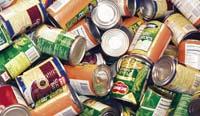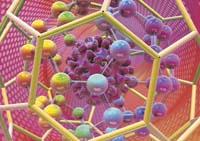Nanotechnology in food, object of study
2010/12/01 Elhuyar Zientzia Iturria: Elhuyar aldizkaria

Experts conclude that there is much to do in safety and regulations
The safety of nanomaterials and regulations have been the axes of the last congress on nanotechnology held by the Institute of Food Technology IFT.
The US institute IFT is an international benchmark and its annual congress has a great influence on the food industry. This conference on nanotechnology analyzed other aspects such as the possibilities of nanotechnology in the food industry and research investments. In the magazine published by the institute after the congress, two aspects have been highlighted: security and regulation.
The article mentions a conference on safety and risks. The speaker was Bernadene Maguson, from the Health Sciences Organization of Cantox, who said that most studies conducted in this field are "scarce".
Cantox is an international organization specializing in science, legislation and food consultancy that has analyzed 30 research on the toxicity of nanoproducts in the food industry. Magusón presented the results of the investigation and, according to him, most of the investigations do not provide sufficient data, especially on the characteristics of the nanomaterial investigated.
In addition, some investigations are too brief or present gaps in some key steps of the methodology. Therefore, Magusón considers that in order for the results to be considered reliable, it would be necessary to explain in more detail the nature and characteristics of the nanomaterials investigated. In addition, research should be designed better and last longer.

Stefan Weigel, a researcher at the Dutch Institute for Food Safety, highlighted the difficulties in investigating these compounds. In fact, nanotechnology compounds are very varied, both for their size, extent, chemical characteristics and for their activity. Therefore, it is not easy to create valid research protocols for all, nor with comparable results.
Regulations in question
However, the World Health Organization has also taken care of the issue and last year published a report that collected the work of international experts. The Food and Agriculture Organization of the United Nations (FAO) considers that food risk regulations are appropriate for food based on nanotechnology. However, the report recognizes the need for deeper studies in some areas, including security and measures to ensure it.
In addition, regulations remain quite limited. For example, in the European Union it is not regulated how nanomaterials should appear on the label or whether they should be explained. That is, if a food contains this type of ingredients, you do not have to indicate it on the label. In principle this issue is being discussed, but it is not easy to decide, since nanotechnology is not even defined in the same way in all places.
However, the issue is a priority for those who have invested in nanotechnology, since they do not want to lose the interest of the industry or the trust of consumers. Therefore, steps are likely to be taken shortly to ensure safety and create sound regulations.

Gai honi buruzko eduki gehiago
Elhuyarrek garatutako teknologia






